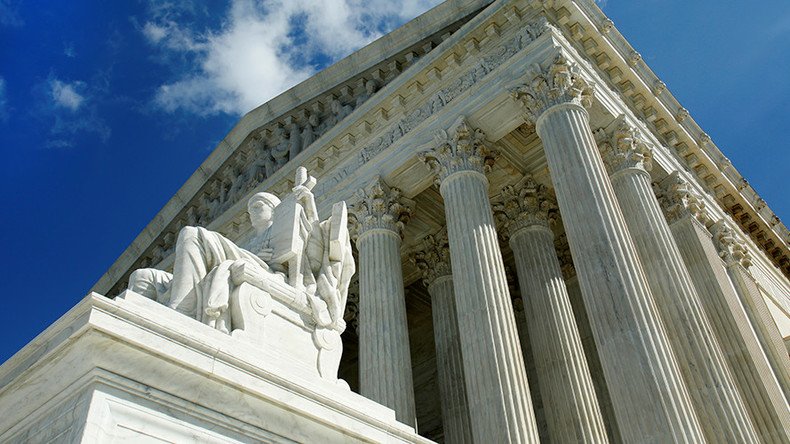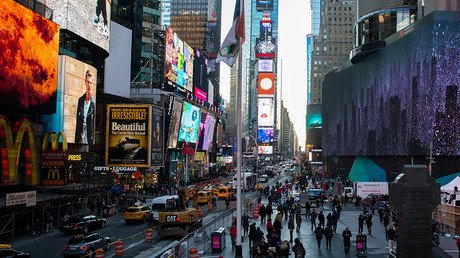Bush admin officials can’t be held liable for post-9/11 Muslim profiling & abuse, SCOTUS rules

The US Supreme Court has ruled that high-level officials under former President George W Bush cannot be held personally liable for the treatment of detainees who were rounded up after the terrorist attacks on September 11, 2001.
In a 4-2 decision Monday, a depleted bench of Supreme Court justices ruled on a civil-rights lawsuit that was filed by a group of Muslim, Arab and South Asian non-citizens in 2002. The plaintiffs, among hundreds arrested and detained after the September 11, 2001 terrorist attacks, accused high-level executive officials of violating the US Constitution by allowing illegal detention policies to be implemented.
#SCOTUS allowing federal government more time to file additional briefs re request to reinstate revised #TravelBanhttps://t.co/XbQGbuw3rz
— RT America (@RT_America) June 14, 2017
The ruling reversed an earlier decision by the Second Circuit Court of Appeals that allowed claims to go forward against three former officials in the Justice Department: former Attorney General John Ashcroft, former FBI director Robert Mueller, and former Immigration and Naturalization Service Commissioner James Ziglar. The three officials risked being on the line for personal liability if the court ruled against them.
The six plaintiffs were seeking damages for alleged violations of their constitutional protection to due process. They also argue they were detained as terrorism suspects based on their apparent race, religion, or ethnicity in violation of the equal protection rights component of the Fifth Amendment.
In the wake of the 9/11 attacks, the FBI arrested and detained more than 700 non-US citizens of Muslim, Arab and South Asian heritage on immigration charges. The lawsuit charges that those immigrants were detained in harsh conditions, despite only being charged with civil immigration violations.
The plaintiffs were allegedly subjected to live in tiny cells for 23 hours a day, where they were denied access to “most forms of communication with the outside world” and were held at the Metropolitan Detention Center (MDC) in Brooklyn, New York for three to eight months. Since they were in the country illegally at the time, all the plaintiffs were deported from the country upon their release.
On Monday, the Supreme Court decided that the suit for money damages could not proceed without authorization from Congress.
"After considering the special factors necessarily implicated by the detention policy claims, the Court now holds that those factors show that whether a damages action should be allowed is a decision for the Congress to make, not the courts," Justice Anthony Kennedy wrote for the court.
Writing the dissent, Justice Stephen Breyer compared the detention of Muslims after September 11 to the internment of more than 70,000 American citizens of Japanese origin after the attacks on Pearl Harbor.
“History tells us of far too many instances where the Executive or Legislative Branch took actions during time of war that, on later examination, turned out unnecessarily and unreasonably to have deprived American citizens of basic constitutional rights,” Breyer wrote.
Rachel Meeropol, Senior Staff Attorney for the Center for Constitutional Rights, the advocacy group that represented the detainees, said they were “very disappointed” with the court’s dismissal of their clients’ claims.
“The Court’s decision allows for high-level officials to violate the Constitution without fear of personal accountability—a dangerous message in this time of rampant state-sponsored discrimination against Muslim and immigrant communities,” Meeropol said in a statement.
Benamar Benatta, one of the plaintiffs, also called the decision “a total failure of justice.”
“It is only by holding high-level officials to account when their policies are ineffective or discriminatory that a country can properly heal and look forward to the future,” Benatta said.
“It is only by holding high-level officials to account...that a country can properly heal & look fwd to the future.” https://t.co/U2lmeUgar5pic.twitter.com/pM2pueT1Bk
— The CCR (@theCCR) June 19, 2017
The justices, however, did allow claims against detention facility warden Dennis Hasty to be argued in a lower court. The suit accuses Hasty and the facility of subjecting detainees to punitive strip searches in violation of the Fourth and Fifth Amendments.
Justices Elena Kagan and Sonia Sotomayor recused themselves, because they dealt with the case in previous jobs, and Justice Neil Gorsuch was not on the bench when the case was argued.
#Saudi banks, #binLaden companies sued by US insurers over #9/11 terror attacks. https://t.co/cdgZUrZCx0pic.twitter.com/29dqXpCWM0
— RT America (@RT_America) April 14, 2017













